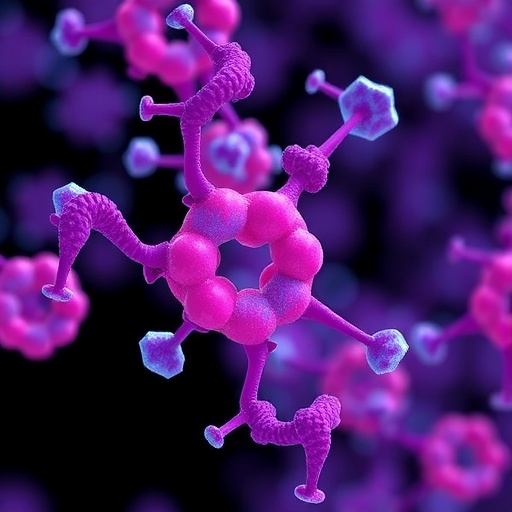In a groundbreaking study that could revolutionize treatment strategies for breast cancer, researchers have identified a naturally occurring protein that significantly enhances the effectiveness of chemotherapy drugs. This protein, known as FGD3, has been observed to play a pivotal role in increasing the susceptibility of breast cancer cells to anticancer agents such as doxorubicin — a chemotherapy staple — and the experimental drug ErSO. The discovery not only deepens scientific understanding of cancer cell biology but also opens new pathways for amplifying the body’s immune response against tumors.
The team behind this research comprises scientists from the University of Illinois Urbana-Champaign and the University of Chicago Medicine, who collaborated to unravel the complex mechanisms by which FGD3 influences cancer cell viability under therapeutic stress. Their findings, published in the Journal of Experimental & Clinical Cancer Research, reveal that FGD3 acts as a critical mediator in a lytic cell death process, essentially causing cancer cells to swell and rupture when exposed to specific anticancer drugs.
Fundamental to their experimentation was the utilization of ErSO, an innovative compound that had previously demonstrated nearly complete eradication of estrogen-receptor-positive breast cancer in mouse models. Unlike conventional chemotherapy agents that typically inhibit essential cellular functions, ErSO paradoxically hiperactivates a cellular stress pathway that cancer cells exploit for survival. This overactivation, however, backfires, resulting in the dramatic swelling and subsequent bursting of malignant cells.
The study’s lead investigator, Professor David Shapiro, explains that the conventional understanding of chemotherapy’s mechanism hinges on promoting apoptosis—a programmed, orderly cell death. ErSO’s mechanism deviates significantly by triggering a catastrophic failure within the cancer cells, disrupting cellular architecture and forcing cells to rupture from the inside out. This kind of lytic death presents a double advantage: it directly eliminates cancer cells and simultaneously exposes intracellular components to the immune system.
To elucidate the role of FGD3 in this process, researchers employed a gene-editing approach across breast cancer cell lines. By systematically deleting genes and observing the impact on susceptibility to ErSO, the team identified FGD3 as a top candidate influencing the drug’s efficacy. Intriguingly, FGD3, while usually promoting cancer cell flexibility and motility under normal conditions, turns into an agent of destruction when the cell undergoes chemotherapy-induced stress.
Experimental data show that FGD3 fosters the weakening of the cancer cell’s cytoskeleton and membrane integrity. This weakening contributes to the formation of swollen, compromised cells prone to rupture upon chemical insult. Such ruptures release tumor antigens and danger signals, which are crucial for the activation of the innate immune system, including the recruitment of macrophages and natural killer cells. This immune activation is pivotal because breast cancer, particularly solid tumors, has been historically resistant to immune-based therapies.
The researchers extended their experiments beyond traditional two-dimensional cultures by incorporating three-dimensional breast cancer organoids derived directly from patients’ tumors. These organoids mimic the complex tumor microenvironment more faithfully, thereby providing more clinically relevant insights. Results consistent with the 2D cultures endorsed the essential functions of FGD3 in enhancing drug-responsive cell death.
In vivo studies involving mouse models corroborated these findings, demonstrating that higher FGD3 expression correlated strongly with increased cancer cell destruction following treatment with ErSO. Furthermore, the elevated presence of FGD3 was linked to enhanced trafficking of immune-stimulatory proteins to the cancer cell surface, effectively marking the cells for immune attack.
An expansive analysis of clinical breast cancer data sets further solidified the potential prognostic value of FGD3. Across diverse breast cancer subtypes and chemotherapy regimens, a positive correlation emerged between FGD3 levels and patient responsiveness. Patients whose tumors expressed higher quantities of FGD3 consistently showed improved outcomes when treated with chemotherapeutic agents.
The broader implications of this study extend beyond breast cancer. Researchers are optimistic about investigating FGD3’s role in other cancer types and assessing whether this pathway could become a universal target to enhance chemotherapy efficacy while potentially lowering drug toxicity. Given the challenges of immunotherapy success in solid tumors, leveraging FGD3-mediated lytic death mechanisms could represent a significant leap forward in integrated cancer therapies.
This discovery is a testament to the power of interdisciplinary research, integrating molecular biology, genetics, immunology, and clinical oncology. It also exemplifies how targeting cellular stress pathways might uniquely tip the balance from cancer cell survival to cell destruction, offering a new weapon against cancer’s notorious resilience.
With patents filed and ongoing collaborations between academic institutions and biotech companies, the translational path from this discovery to clinical application looks promising. Future clinical trials will be critical to determine the safety and efficacy of therapies designed to modulate FGD3 activity and its associated pathways.
Ultimately, this research signifies a new horizon in the relentless battle against breast cancer. By harnessing cellular proteins like FGD3, there is hope to design next-generation therapies that not only eradicate tumor cells more efficiently but also enlist the body’s immune system in eliminating residual disease, improving patient prognosis and quality of life.
Subject of Research: Breast Cancer
Article Title: FGD3 mediates lytic cell death, enhancing efficacy and immunogenicity of chemotherapy agents in breast cancer
News Publication Date: 12-Nov-2025
Web References: http://dx.doi.org/10.1186/s13046-025-03559-5
References: Zhu, J. et al., Journal of Experimental & Clinical Cancer Research, 2025
Image Credits: Graphic created in BioRender. Zhu, J. (2025)
Keywords: FGD3, breast cancer, ErSO, doxorubicin, chemotherapy, lytic cell death, cancer immunotherapy, estrogen receptor-positive breast cancer, cancer cell rupture, immune activation, natural killer cells, cancer metastasis




